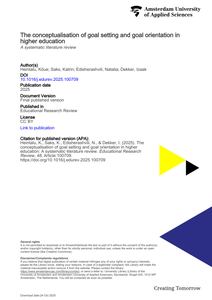Student goals play a crucial role in both practice and theory in higher education, particularly for understanding and enhancing student motivation. However, on a conceptual level, goals are studied through separate and isolated frameworks, which complicates the ability of practitioners and researchers to combine insights from both streams of scholarship effectively. This systematic review aimed to comprehensively examine and describe the frameworks (198 studies), and conceptual distinctions and characteristics (48 studies) used in research on goal setting and goal orientation in the context of higher education since 2018. The studies selected for analysis had to discuss students’ learning process, address goal setting and goal orientation, and be published in academic journals in English. Goal-setting theory was the most frequently used for the goal-setting concept, while achievement goal theory (2 × 2 model) dominated for goal orientation. Summative content analysis revealed that goal-setting frameworks primarily emphasised the concept of the goal itself, including its structure, goal commitment, implementation intentions, and the processes leading to goal achievement. In contrast, goal orientation frameworks delved deeper into the underlying motivations driving goal pursuit, exploring related attitudes, addressing specific educational objectives and strategies, emotional factors, and the detailed standards individuals set for their outcomes. Because these theories are complementary, we propose an integrated goal setting and orientation (IGSO) theory, which can help in studying and understanding how motivation for goal pursuit is connected with the setting, monitoring and evaluation of goals.
MULTIFILE

This study explores the psychometric properties of three instruments: a semi-structured interview, a questionnaire and a sorting task. The central question is which instrument is most suitable to investigate the goal orientations of students in competence-based Pre-Vocational Secondary Education. The questionnaire proved most accurate. The interview provided relevant supplementary information on the goals of the students and underlying motives. The sorting task appeared to be less suitable.
DOCUMENT
The purpose of this study was to investigate relations between goal orientations, information processing strategies and development of conceptual knowledge of pre-vocational secondary education students (n=719; 14 schools). Students' preferences for certain types of goals and information processing strategies were examined using questionnaires. Conceptual knowledge was investigated by having students create concept maps before and after a learning project. Structural analyses showed that student preferences for mastery and performance goals positively affected their preferences for the use of deep and surface information processing strategies. Preferences for work avoidance goals negatively influenced preferences for deep and surface processing. Use of surface information processing strategies negatively affected the development of conceptual knowledge. Remarkably, no relation was found between students' preferences for deep processing strategies and development of conceptual knowledge.
LINK